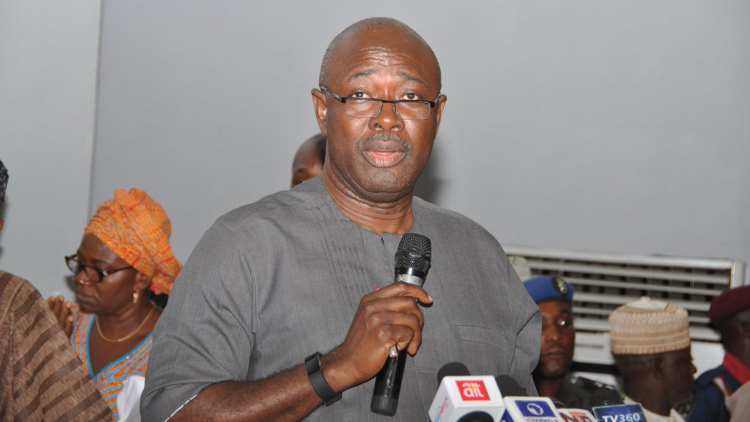Contrary to claims made by the President of Dangote Refinery and Petrochemical Company Ltd, Aliko Dangote that the Federal Executive Council will determine the price of petroleum products from his refinery, the federal government on Thursday said it does not fix the price of petrol.
The Minister of State for Petroleum Resources (Oil), Senator Heineken Lokpobiri, gave the government’s position during an interview with journalists shortly after a meeting with Vice President Kashim Shettima.
The meeting, held at the State House came from a directive issued by President Bola Tinubu to the Vice President to convey the meeting.
In attendance at the meeting was the Group Chief Executive Officer of the Nigerian National Petroleum Company Ltd, Mele Kyari, the National Security Adviser Nuhu Ribadu, and the Executive Director of the Nigerian Midstream and Downstream Petroleum Regulatory Authority, Ogbugo Ukoha.
Dangote had on Tuesday claimed that the Federal Executive Council is working on a new pricing arrangement for petrol produced from his refinery.
The 650,000-barrel-per-day facility officially unveiled its refined petrol on Tuesday with Dangote announcing that products will be in filling stations in the next 48 hours depending.
Speaking on the retail price, Dangote had stated, “It is an arrangement which is designed and approved by the Federal Executive Council led by His Excellency, President Bola Ahmed Tinubu.
“As soon as it is finalised, which he (Tinubu) is pushing, once we finish with NNPC, it can be today, it can be tomorrow, we are ready to roll into the market.”
But speaking on the development, the minister said the petroleum industry has been deregulated following the passage of the Petroleum Industry Act.
This, Lokpobiri added, has enabled prices in the sector to be determined by the forces of demand and supply.
He added that with this arrangement, the federal government has no business fixing the prices of petroleum products.
He said, “We were summoned by the Vice President who was directed by the President to call for this meeting and we have been with him to brief him on what is going on across the country.
“And the most important is to convey to Nigerians that the President is working and empathetic about what is going on in the country.
“He is concerned about the hardship among Nigerians and that is why he directed the VP to call this meeting for us to reflect on what is going on in the country.
“What is important is that products are available in the country and we believe that between now and the weekend, there will be availability of products across the length and breadth of the country.
“The price could be higher in some other locations much more than other areas and we believe that when there is availability of product all across the country, the price will stabilize.
“The government is not fixing prices, this sector is deregulated and with the availability of products, the price will find its level. There should not be panic buying and government is not fixing prices.
The NNPC Ltd had on Tuesday increased the pump price of petrol from N568 to N855, N897 (depending on the location per litre) amid lingering fuel scarcity and the country’s crisis.
Many private suppliers already sold fuel at higher prices than the NNPC Ltd with some selling at 1,200 naira per litre on Thursday.
The price increase came a day after NNPC acknowledged it was struggling to maintain fuel supplies because of financial difficulties.
Also speaking shortly after the meeting, the NMDPRA Executive Director said all regulatory efforts are now geared towards stabilizing supply.
He said with the initiatives being implemented by the NNPC Ltd and the government, there are positive signs that the price of petrol would be stabilized.
Ukoha said, “All regulatory efforts are now geared towards stabilizing supply and we believe that it will be positive on the stability of price.
“And to that objective, the regulator has ensured that there are increased operating hours from all depots, vessels are being cleared promptly, and extended hours where safety can permit for truck-out as well.
“More importantly, is the reinforcement of the support being given to local refineries because with increased production from them, indeed there will be higher supply which will stabilize the price.”










